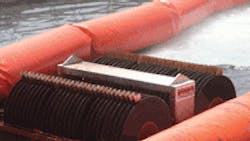In the wake of the oil disaster, following the sinking of the Deepwater Horizon on April 21 in the Gulf of Mexico, clean-up crews are relying on innovative technologies to try to contain the ever-expanding cloud of crude which threatens the ecology of the region.
One such technology which has been put to use is Fuzzy2, a material that comes from Abanaki Corp., a small manufacturer of industrial oil skimmers based out of Chagrin Falls, Ohio.
The new Fuzzy2 material is being used on disk skimmers, which use a rotating disk to remove oil from water. What's unique about Fuzzy2 is that it has three times the oil-removal capacity of standard disk-skimming material.
Even more notable? It was never even designed for use in marine applications.
The material collects oil as the disk passes through the water, and wiper blades scrape it off for collection. The Fuzzy2 material is attached to the surface of 56 30-inch-diameter skimming disks on a floating skimmer and has removed as much as 385 gallons of oil per minute from the water's surface.
One of the unique qualities of the Fuzzy2 material is its surface area, which is hairy, unlike other disk materials, allowing it to remove more oil.
The Fuzzy2 was only being tested in recent months when the Deepwater Horizon spill occurred in April. The material was applied to two of approximately 100 boats operating disk skimmers in the region, with mixed results. When deployed in small sheens of oil, there's simply not enough oil to pick up. When used in an area where chemical dispersant had been applied, the oil turns to tar, negating the technology's advantages. But in areas where the oil is thick and untouched by dispersant chemicals, it removed large sums.
"You need the right boat captain, the right boat to put it on, and it needs to be in the right area," says Abanaki. "There's a lot of slip between the cup and the lip. But it's a heck of a technology and it's been great for us. With the tragedy that happened down there, you just hope you can do your part to help."
